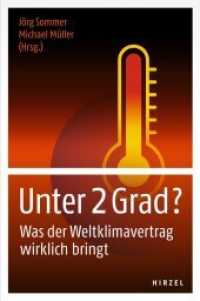Full Description
Designed to facilitate teachers' efforts to meet the actual challenges and dilemmas they face in their classrooms, Becoming a Teacher Researcher in Literacy Teaching and Learning:
provides background information and key concepts in teacher research
covers the "how-to" strategies of the teacher research process from the initial proposal to writing up the report as publishable or presentable work
illustrates a range of literacy topics and grade levels
features twelve reports by teacher researchers who have gone through the process, and their candid remarks about how activities helped (or not)
helps teachers understand how knowledge is constructed socially in their classrooms so that they can create instructional communities that promote all students' learning.
Addressing the importance of teacher research for better instruction, reform, and political action, this text emphasizes strategies teachers can use to support and strengthen their voices as they dialogue with others in the educational community, so that their ideas and perspectives may have an impact on educational practice both locally in their schools and districts and more broadly.
Contents
Preface
Part 1: Defining, Planning, and Starting Your Teacher Research
Part 1 Introduction
So, What Is Teacher Research Anyway?
Creating Your Research Questions—The First Step in Inquiry
Planning Your Inquiry
Writing a Preliminary Literature Review to Inform Your Inquiry
Part 2: Enacting, Analyzing, and Writing Up Your Inquiry
Part 2 Introduction
Strategies for Data Collection
Analysis—What do the Data Mean?
Writing Up Your Inquiry as an Evocative Account
Part 3: Teacher Researcher Reports
Part 3 Introduction
Katie Paciga's Inquiry Paper
Reading, Writing, and Sharing: The Journey to Become Kindergarten Authors
Cindy Pauletti's Inquiry Paper
Word Detectives: Students Using Clues to Identify Unknown Words in Text
Kristen Terstriep's Inquiry Paper
Toss Out Your Dictionaries: A Look at More Effective Vocabulary Instruction
Sandra Zanghi's Inquiry Paper
Letting Their Voices Be Heard: Improving Literature Response Participation during Read-Alouds through Small-Group Discussions
Tara Braverman's Inquiry Paper
What's This Word? Helping Sixth Grade Students Use Reading and Vocabulary Strategies Independently
Libby Tuerk's Inquiry Paper
Let's Read: Motivating Junior High Students to Become Life-Long Readers
Meg Goethals's Inquiry Paper
"Books that Have Ghetto Feelings": How Reading Workshop Increases Inner-City Eighth-Graders' Motivation, Engagement, and Comprehension
Dawn Siska's Inquiry Paper
Challenging the "I Quit!" Going 'Round and 'Round with Literature Circles in a Secondary Reading Classroom
Courtney Wellner's Inquiry Paper
"But This IS My Final Draft!" Making Peer Writing Conferences More Effective for Struggling 9th Grade Students
Shannon Dozoryst's Inquiry Paper
Using Writing Workshop to Guide Revision
Nicole Perez's Inquiry Paper
Coaching as a Collaborative Process
Catherine Plocher's inquiry Paper
Coaching for Change in a K-8 Urban Elementary School: Building Cultures of Collaboration and Reflective Practices
Epilogue: Further Reflections and Possibilities
Appendices
Appendix A: General Peer Conferencing Form
Appendix B: Common APA (American Psychological Association) Citing Conventions
Appendix C: Reminders for Grammatical and Other Language Usage
Index








